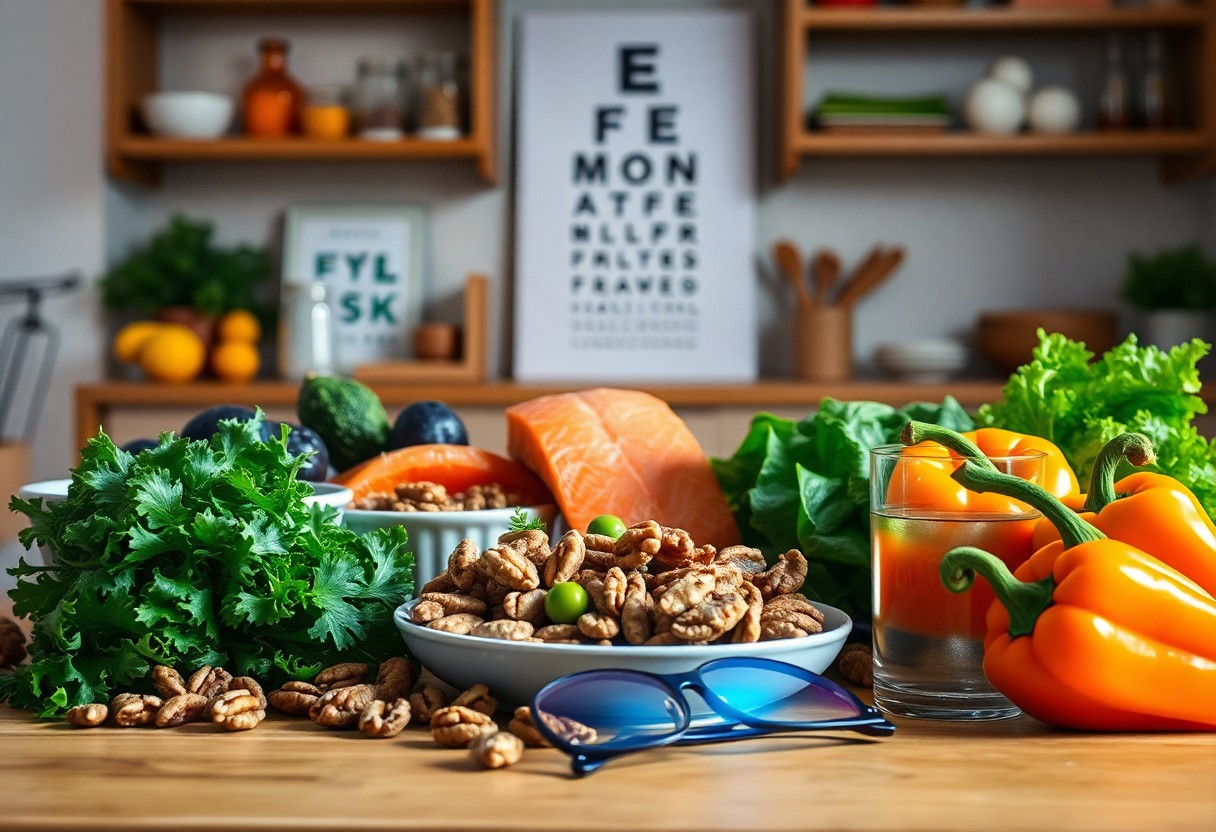Eyesight plays a vital role in your daily life, and taking proactive steps can enhance your visual health at any stage. By incorporating natural methods into your routine, you can support stronger eyesight and reduce the risk of common vision problems. This post explores effective strategies, from dietary choices to eye exercises, enabling you to empower your vision naturally. With consistent care and attention, you can enjoy clearer sight and improved eye health for years to come.
Key Takeaways:
- Regular eye exams are important for early detection of vision problems.
- Nutrition plays a significant role; foods rich in antioxidants can support eye health.
- Protecting eyes from UV light with sunglasses helps reduce the risk of cataracts.
- Engaging in eye exercises can help reduce eye strain, especially for those who spend long hours on screens.
- Maintaining a healthy lifestyle, including regular exercise, benefits overall eye health.
The Science of Vision: How Our Eyes Work
Your eyes are complex organs that allow you to perceive the world around you. Light enters through the cornea and then passes through the pupil, where it is regulated by the iris. The lens focuses the light onto the retina, which contains photoreceptor cells that convert light into electrical signals. These signals travel through the optic nerve to the brain, where they are interpreted as images. Understanding this process highlights how interconnected your eyes and brain are in creating your visual experiences.
Anatomy of the Eye: Understanding the Basics
The eye consists of several key structures that collaborate to produce sight. The cornea provides initial focus for incoming light, while the lens fine-tunes this focus. The retina, located at the back of the eye, captures light and triggers photoreceptors known as rods and cones. Rods help with night vision, and cones aid in color perception during daylight. The optic nerve transmits the information processed by these cells to your brain, forming the visual picture you see.
Common Vision Issues: Recognizing the Signs
Many people experience vision issues, but recognizing the signs early can lead to effective treatment. Symptoms like blurred vision, difficulty focusing, eye fatigue, or frequent headaches may indicate refractive errors such as myopia or hyperopia. Other signs include halos around lights or suddenly reduced vision, which can signal conditions like cataracts or glaucoma. Early awareness allows you to consult an eye care professional for a proper evaluation and potential corrective measures.
Being aware of common vision issues can significantly impact your eye health. For instance, myopia, or nearsightedness, affects about 30% of adults and can cause blurred distance vision. Hyperopia, on the other hand, results in trouble focusing on close objects. Dry eye syndrome often results in discomfort and can exacerbate existing eye problems. Recognizing these signs not only prompts you to seek professional help but also encourages proactive measures, such as regular eye exams and incorporating eye-friendly nutrition into your diet.

Nutritional Foundations for Eye Health
Your diet is instrumental in maintaining and enhancing eye health. Certain nutrients play a pivotal role in protecting your eyesight and preventing common eye diseases. By incorporating specific foods rich in these nutrients, you can support the long-term health of your vision and reduce the risk of deterioration as you age.
Essential Vitamins and Minerals for Optimal Vision
Foods That Boost Eye Health: A Culinary Approach
Incorporating specific foods into your meals can significantly benefit your eye health. Leafy greens like spinach and kale, colorful vegetables such as carrots and bell peppers, and fatty fish like salmon are excellent choices. Adding these foods to your diet not only enhances flavor but also provides crucial nutrients that your eyes need.
To boost eye health, consider creating vibrant salads with spinach or kale as a base, topped with sliced carrots, bell peppers, and a sprinkle of walnuts for omega-3s. Smoothies made with blueberries and natural yogurt can be an easy breakfast packed with antioxidants. Roasting fatty fish like salmon with herbs and lemon makes for a delicious dinner rich in omega-3s. These culinary approaches not only elevate your meals’ nutritional value but also tantalize your taste buds while nurturing your vision.

Lifestyle Modifications for Lasting Eye Strength
Making intentional lifestyle changes can significantly bolster your eye health. Simple modifications, such as prioritizing proper lighting when reading, adopting a balanced diet rich in eye-friendly nutrients, and getting regular eye exams, contribute to lasting eye strength. Additionally, managing stress through relaxation techniques can reduce strain on your eyes, making it easier to maintain optimal vision as you age.
The Impact of Screen Time: Balancing Technology Use
Prolonged screen time can lead to digital eye strain, causing discomfort and blurred vision. To counteract this, incorporate the 20-20-20 rule into your routine: every 20 minutes, look at something 20 feet away for at least 20 seconds. This simple practice helps to relax your eye muscles and reduce fatigue while allowing you to enjoy your digital devices without compromising your eye health.
Physical Activity: Exercises for Enhanced Eye Function
Regular physical activity is beneficial not only for your overall well-being but also for your eye function. Engaging in exercises that improve circulation can enhance blood flow to your eyes, delivering imperative nutrients and oxygen. Specific eye exercises, like focusing on a nearby object followed by a distant one, may strengthen your eye muscles and improve your focusing ability.
Incorporating activities such as yoga and stretches that involve eye movement can further support this goal. For instance, the practice of shifting your gaze between objects at different distances enhances your natural focusing skill. Aim to include eye exercises in your daily routine, dedicating just a few minutes to them can help mitigate the effects of fatigue from screen time and promote overall eye health.

Mindfulness and Vision: The Connection Between Stress and Sight
Stress can significantly impact your eyesight, often leading to eye strain and discomfort. By adopting mindfulness practices, you can effectively reduce stress levels, which may enhance your overall vision quality. Techniques such as deep breathing or meditation can alleviate tension and allow your eyes to recover. Incorporating habits learned from 8 Tips To Help You Improve Your Vision Naturally can more comprehensively support stronger eyesight.
How Stress Affects Vision: Unpacking the Link
Elevated stress hormones can lead to physical symptoms, including blurred vision and headaches. This connection is primarily due to the muscles around your eyes tightening under stress, causing strain. Chronic stress has even been linked to conditions like dry eyes and eye nerve damage. Being aware of how your mental state influences your eyes can be the first step toward better vision.
Eye Relaxation Techniques: Practical Exercises to Implement
Incorporating specific eye relaxation techniques into your daily routine can mitigate the negative effects of stress on your vision. Simple practices like the 20-20-20 rule, where you take a 20-second break to look at something 20 feet away every 20 minutes, can provide relief. Additionally, performing eye rolling exercises or gentle palming can further reduce eye strain and promote relaxation. Regular practice of these techniques can help maintain your eye health and enhance clarity.
Engaging in eye relaxation techniques like the 20-20-20 rule not only offers immediate relief but also promotes long-term eye wellness. You can also try focusing on your breathing while slowly rolling your eyes in all directions, which can open up circulation and help decrease tension. Palming, where you gently cup your palms over your closed eyes without applying pressure, is particularly effective at relieving strain. Incorporate these exercises during breaks from screen time for optimal benefits.
The Role of Preventive Care: Regular Check-ups and Screening
Preventive care is integral to maintaining strong eyesight throughout your life. Regular eye check-ups not only assess your vision but also allow for the early detection of conditions like glaucoma, macular degeneration, and diabetic retinopathy. By prioritizing these appointments, you empower yourself with the knowledge to take proactive measures in preserving your eye health. A simple visit can save you from more severe complications down the line, ensuring your vision remains clear as you age.
Importance of Routine Eye Exams: Detecting Issues Early
Routine eye exams serve as your first line of defense against vision problems. During these appointments, eye care professionals can identify abnormalities and changes in your sight that might otherwise go unnoticed. For example, conditions like high blood pressure can manifest in the eyes, providing critical insights into your overall health. Addressing these issues early can lead to more effective treatments and better long-term outcomes.
Understanding Vision Therapy: A Holistic Support Approach
Vision therapy offers a comprehensive technique aimed at enhancing visual skills and improving overall eye function. This customized approach involves exercises designed to train the brain and eyes to work together more effectively, addressing issues like convergence insufficiency or amblyopia. By incorporating visual activities tailored to your specific needs, vision therapy fosters stronger eyesight and can even alleviate symptoms related to digital eye strain.
Engaging in vision therapy often includes activities such as eye tracking, focusing drills, and the use of optometric instruments, which can greatly improve visual abilities. Success stories showcase improvements in academic performance and daily life for individuals of all ages who struggle with visual processing issues. Furthermore, therapy sessions are typically monitored by qualified professionals, ensuring personalized adjustments based on your progress and feedback. For many, this holistic support approach not only enhances eyesight but also enriches overall cognitive function and quality of life.
Conclusion
From above, it is evident that supporting stronger eyesight at any age involves a holistic approach encompassing proper nutrition, regular eye exercises, and protective measures against harmful environmental factors. By incorporating these natural methods into your daily routine, you can enhance your vision and maintain eye health over time. Prioritizing these habits will empower you to take charge of your eye care and promote lasting visual clarity, ensuring you can enjoy the world around you with greater ease.
FAQ
Q: What natural methods can improve eyesight?
A: Natural methods to enhance eyesight include consuming a balanced diet rich in vitamins A, C, and E, omega-3 fatty acids, and antioxidants. Regular eye exercises, maintaining a healthy weight, staying hydrated, and protecting eyes from UV light are also beneficial.
Q: How does diet impact eye health?
A: Diet directly affects eye health by providing crucial nutrients that support vision. Foods high in lutein and zeaxanthin, such as leafy greens, along with fruits and vegetables, help reduce the risk of age-related eye conditions and improve overall eye function.
Q: Are there specific exercises for eye strength?
A: Yes, exercises like focusing on near and far objects, rolling the eyes, and palming can strengthen eye muscles, improve focus, and reduce eye strain. Implementing these exercises regularly can support better vision over time.
Q: What role do lifestyle habits play in eye health?
A: Lifestyle habits such as regular physical activity, avoiding smoking, and getting sufficient sleep significantly contribute to eye health. These habits can reduce the risk of developing vision problems and help maintain optimal eyesight.
Q: Can eye protection reduce vision issues?
A: Yes, wearing sunglasses that block UV rays and using protective eyewear during activities can prevent damage to the eyes. Limiting screen time and using proper lighting can also minimize strain and promote better vision quality.

Leave a Reply